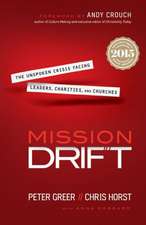The Power of Team Leadership: Achieving Success Through Shared Responsibility: Barna Reports for Highly Effective Churches
Autor George Barnaen Limba Engleză Hardback – 30 sep 2001
In The Power of Team Leadership, noted researcher George Barna demonstrates the incredible difference lay-team leadership can make in a church’s ministry. Based on Barna’s latest national studies, the book sets forth clearly what churches need to know in order to recruit, train, and deploy lay leadership teams for maximum effectiveness in the Kingdom of God.
Preț: 120.48 lei
Nou
Puncte Express: 181
Preț estimativ în valută:
23.06€ • 23.73$ • 19.44£
23.06€ • 23.73$ • 19.44£
Carte indisponibilă temporar
Doresc să fiu notificat când acest titlu va fi disponibil:
Se trimite...
Preluare comenzi: 021 569.72.76
Specificații
ISBN-13: 9781578564248
ISBN-10: 1578564247
Pagini: 224
Dimensiuni: 149 x 218 x 24 mm
Greutate: 0.4 kg
Editura: Waterbrook Press
Seria Barna Reports for Highly Effective Churches
ISBN-10: 1578564247
Pagini: 224
Dimensiuni: 149 x 218 x 24 mm
Greutate: 0.4 kg
Editura: Waterbrook Press
Seria Barna Reports for Highly Effective Churches
Notă biografică
George Barna received a doctorate from Dallas Baptist University, worked in the Massachusetts state legislature and as a pollster and a campaign manager. George and his wife, Nancy, founded the Barna Research Group in 1984. In 2004, he re-engineered the for-profit corporation into The Barna Group, of which he is the Directing Leader. The firm analyzes American culture and creates resources and experiences designed to facilitate moral and spiritual transformation.Located in Ventura, California, The Barna Group provides primary research (through its Barna Research Group division); musical, visual and digital media (through BarnaFilms); printed resources (BarnaBooks); spiritual and leadership development for young people (The Josiah Corps); and church enhancement (Transformational Church Network). To date, Barna has written 39 books, including best sellers such as Revolution, Transforming Children into Spiritual Champions, The Frog in the Kettle, and The Power of Vision. His most recent books include Revolutionary Parenting and Pagan Christianity? The Barna Research division has served several hundred parachurch ministries and thousands of Christian churches throughout the country. It has conducted research for numerous parachurch organizations, such as the Billy Graham Evangelistic Association; World Vision; American Bible Society; Campus Crusade for Christ; Thomas Nelson Publishers; Zondervan; and Tyndale House Publishers.
Recenzii
“We have developed an unreasonable notion of what a leader should do. Who could possibly meet such a range of disparate expectations? Leadership works best when it is provided by teams of gifted leaders working together in pursuit of a clear and compelling vision.” –George Barna
Extras
CHAPTER ONE
Are We Setting Up Pastors —and Churches— for Failure?
The problem is not our leaders but the unhealthy expectations we have of them.
Most of us have bought into an unhealthy understanding of leadership.
We have been taught that leadership is about one individual’s performing all of an organization’s critical tasks—motivating, mobilizing, directing, and resourcing people to fulfill a vision—at a level of excellence and influence that separates him or her from the bulk of humanity. The combination of skills and abilities required to be a great leader has caused many people to lament the absence of leaders in our society.
Let me share why I believe we have unrealistic expectations for our leaders. In a nationwide survey we conducted among 1,005 adults, people identified those things they feel are “very important” for a leader to do. Here is the profile:
• 87 percent expect leaders to motivate people to get involved in meaningful causes and activity
• 78 percent believe leaders should negotiate compromises and resolve conflicts when they arise
• 77 percent look to leaders to determine and convey the course of action that people should take in order to produce desirable conditions and outcomes
• 76 percent rely on leaders to identify and implement courses of action that are in the best interests of society, even if some of those choices are unpopular
• 75 percent expect leaders to invest their time and energy in training more leaders who will help bring the vision to reality
• 63 percent want leaders to communicate vision so that they know where things are headed and what it will take to get there
• 61 percent say leaders are responsible for the direction and production of employees associated with the leader’s organization or cause
• 61 percent think leaders should analyze situations and create the strategies and plans that direct the resources of those who follow them
• 56 percent hold leaders responsible for managing the day-to-day details of the operation.
The list goes on, but it clearly shows that we have developed an unreasonable notion of what a leader should do. Look at the breadth of tasks and abilities demanded by the expectations reflected in that survey—and realize, of course, that most people hold additional expectations beyond those listed. We expect the central leader not only to provide the corporate vision, but also to:
• direct activity
• encourage participants
• supply resources
• evaluate plans and progress
• motivate participants
• negotiate agreements
• strategize
• manage people
• reinforce commitments
• recruit necessary colleagues
• communicate conditions, plans, and assignments
• train new leaders
• resolve conflicts
• and so on
Who could possibly meet such a wide range of disparate expectations?
SET UP FOR FAILURE
Would you agree that a person would have to be superhuman to accomplish all of these tasks? Yet that’s what we expect a leader to do. No wonder we are consistently disappointed by leaders who seemed to hold such promise before they assumed positions of significant authority and responsibility. Our surveys have shown that during the past two decades there has been a continual decline in satisfaction with leadership in churches, government, nonprofit organizations, schools, businesses, and families.
When you reach a point of frustration or incapacity, one useful strategy is to go back and question your assumptions to determine if they were errant and therefore contributed to the blockage. If we take that approach to our consternation regarding leadership, we will most likely conclude that the real problem is not our leaders but the unhealthy expectations we have of them. Few men or women have the individual capacity to deliver all that we have come to expect of those in positions of authority. We set leaders up for failure by holding them to absurd performance standards. We set organizations up for failure by intimately tying the success and well-being of the institution to the quality of leadership it receives. We set people up for frustration, disappointment, and failure by basing their present and future well-being upon the capacity of the individual leader whom they most closely follow in any given dimension of their lives.
Are We Setting Up Pastors —and Churches— for Failure?
The problem is not our leaders but the unhealthy expectations we have of them.
Most of us have bought into an unhealthy understanding of leadership.
We have been taught that leadership is about one individual’s performing all of an organization’s critical tasks—motivating, mobilizing, directing, and resourcing people to fulfill a vision—at a level of excellence and influence that separates him or her from the bulk of humanity. The combination of skills and abilities required to be a great leader has caused many people to lament the absence of leaders in our society.
Let me share why I believe we have unrealistic expectations for our leaders. In a nationwide survey we conducted among 1,005 adults, people identified those things they feel are “very important” for a leader to do. Here is the profile:
• 87 percent expect leaders to motivate people to get involved in meaningful causes and activity
• 78 percent believe leaders should negotiate compromises and resolve conflicts when they arise
• 77 percent look to leaders to determine and convey the course of action that people should take in order to produce desirable conditions and outcomes
• 76 percent rely on leaders to identify and implement courses of action that are in the best interests of society, even if some of those choices are unpopular
• 75 percent expect leaders to invest their time and energy in training more leaders who will help bring the vision to reality
• 63 percent want leaders to communicate vision so that they know where things are headed and what it will take to get there
• 61 percent say leaders are responsible for the direction and production of employees associated with the leader’s organization or cause
• 61 percent think leaders should analyze situations and create the strategies and plans that direct the resources of those who follow them
• 56 percent hold leaders responsible for managing the day-to-day details of the operation.
The list goes on, but it clearly shows that we have developed an unreasonable notion of what a leader should do. Look at the breadth of tasks and abilities demanded by the expectations reflected in that survey—and realize, of course, that most people hold additional expectations beyond those listed. We expect the central leader not only to provide the corporate vision, but also to:
• direct activity
• encourage participants
• supply resources
• evaluate plans and progress
• motivate participants
• negotiate agreements
• strategize
• manage people
• reinforce commitments
• recruit necessary colleagues
• communicate conditions, plans, and assignments
• train new leaders
• resolve conflicts
• and so on
Who could possibly meet such a wide range of disparate expectations?
SET UP FOR FAILURE
Would you agree that a person would have to be superhuman to accomplish all of these tasks? Yet that’s what we expect a leader to do. No wonder we are consistently disappointed by leaders who seemed to hold such promise before they assumed positions of significant authority and responsibility. Our surveys have shown that during the past two decades there has been a continual decline in satisfaction with leadership in churches, government, nonprofit organizations, schools, businesses, and families.
When you reach a point of frustration or incapacity, one useful strategy is to go back and question your assumptions to determine if they were errant and therefore contributed to the blockage. If we take that approach to our consternation regarding leadership, we will most likely conclude that the real problem is not our leaders but the unhealthy expectations we have of them. Few men or women have the individual capacity to deliver all that we have come to expect of those in positions of authority. We set leaders up for failure by holding them to absurd performance standards. We set organizations up for failure by intimately tying the success and well-being of the institution to the quality of leadership it receives. We set people up for frustration, disappointment, and failure by basing their present and future well-being upon the capacity of the individual leader whom they most closely follow in any given dimension of their lives.
















